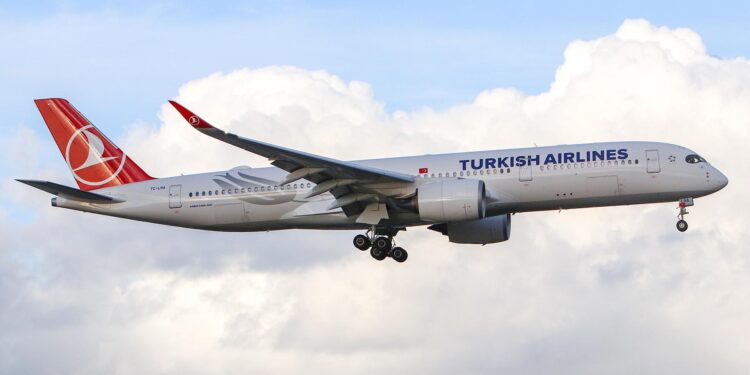Title: Turkish Aviation Faces Challenges in India Amid Boycott Linked to Support for Pakistan
In a significant geopolitical shift, Turkish aviation has come under fire in India, as calls for a boycott gain momentum over Ankara’s ongoing support for Pakistan. Tensions between the two South Asian nations, rooted in historical grievances and regional territorial conflicts, have sparked widespread reactions from various sectors in India. The aviation industry, a vital component of both economic and diplomatic relations, now finds itself at the center of a brewing controversy that could have far-reaching implications. As Indian consumers and businesses express their discontent through targeted measures against Turkish airlines and related services, the unfolding situation raises questions about the future of Turkish investments and partnerships in the subcontinent. This article explores the reasons behind the boycott, the response from Turkish aviation stakeholders, and the potential impacts on India-Turkey relations in light of the evolving geopolitical landscape.
Turkish Aviation Faces Boycott in India Over Political Tensions with Pakistan
In light of recent political developments, Turkish aviation companies have come under scrutiny in India, primarily due to Ankara’s unwavering support for Pakistan. Activists and political groups in India are calling for a boycott of Turkish airlines, urging citizens to reconsider their travel plans. This campaign is fueled by a broader sentiment against Turkey’s alignment with Pakistan, especially in the context of ongoing tensions surrounding regional security and diplomatic relations. Key responses from various sectors calling for the boycott include:
- Social Media Campaigns: Activists have taken to social platforms to share their discontent, promoting hashtags aimed at rallying support for the boycott.
- Public Demonstrations: Various groups have organized protests at airports and travel hubs, showcasing their opposition to Turkish aviation.
- Political Endorsements: Several political leaders have publicly backed the call for a boycott, emphasizing national pride and solidarity with local airlines.
Moreover, the expiration of contracts and partnerships between Indian travel agencies and Turkish airlines is becoming increasingly probable as the boycott gains traction. With a noticeable shift in consumer sentiment, travel industry analysts predict a potential decline in Turkish flight bookings from Indian travelers. To illustrate the impact of the boycott, the following table highlights the expected consequences:
| Impact Area | Potential Outcome |
|---|---|
| Flight Bookings | Decrease by up to 40% |
| Brand Reputation | Significant damage among Indian consumers |
| Partnerships | Contracts under review or terminated |
Impacts of Geopolitical Rivalries on International Business Relations
Recent developments in international relations have underscored the fragility of business ties amid rising geopolitical tensions. The ongoing rift between India and Turkey, exacerbated by Ankara’s support for Pakistan, has led to significant repercussions for Turkish aviation companies. This situation highlights how political alliances and rivalries can directly influence market dynamics and alter the landscape for businesses operating in global markets. As a result, Turkish airlines face a higher likelihood of expanded scrutiny, operational restrictions, and a decline in consumer trust within the Indian consumer base. This boycott demonstrates the swift response of the marketplace to political stances, and businesses often find themselves navigating a complex web of international sentiment.
Furthermore, the ramifications of such geopolitical disputes extend beyond immediate market access issues. The interconnectedness of global trade means that shifts in one region can trigger ripple effects, affecting supply chains and driving up costs for companies dependent on international partners. Several factors contribute to the growing challenges for Turkish businesses, including:
- Trade Sanctions: Potential sanctions that could further isolate Turkish companies from Indian markets.
- Consumer Boycott: Growing public sentiment against Turkish brands, leading to decreased sales.
- Increased Operational Costs: Higher insurance rates and logistical hurdles due to heightened tensions.
Geopolitical rivalries not only shape the immediate interactions between nations but also redefine long-term strategic partnerships in the business world. Companies must remain vigilant and adapt to the rapidly changing political landscapes, as these factors will increasingly dictate the success and viability of international operations.
Strategies for Turkish Airlines to Navigate the Challenging Indian Market
As Turkish Airlines faces increasing scrutiny and a potential boycott in India due to geopolitical tensions, it is imperative for the airline to rethink its market strategies. To effectively navigate challenges in this region, the airline can adopt a multi-faceted approach that prioritizes cultural understanding and strategic partnerships. By enhancing community engagement, Turkish Airlines can bolster its presence and reputation. Initiatives such as:
- Local partnerships: Collaborating with Indian travel companies to offer package deals that showcase both Turkish and Indian cultures.
- Cultural events: Sponsoring and participating in cultural festivals and events in major Indian cities.
- Customer service enhancements: Training staff to cater specifically to Indian clientele, respecting cultural sensitivities.
Moreover, the airline must ensure transparent communication with potential customers to address any misconceptions about its corporate affiliations. Implementing a robust digital marketing strategy tailored to Indian consumers can significantly improve brand perception. This could involve:
- Targeted social media campaigns: Highlighting Turkish Airlines’ contributions to local communities and commitments to customer satisfaction.
- Promotional offers: Launching discounts and loyalty programs specifically designed for Indian travelers.
- Feedback mechanisms: Establishing platforms for Indian customers to share experiences and suggestions for improvement.
Key Takeaways
In conclusion, the tensions between Turkey and India have taken a new turn as the Turkish aviation sector faces significant challenges amid escalating calls for a boycott. This backlash stems from Ankara’s unwavering support for Pakistan, particularly in the wake of rising geopolitical tensions in South Asia. As India navigates its complex diplomatic landscape, the implications of this boycott could resonate throughout the region and beyond, potentially reshaping international aviation partnerships and shifting the dynamics of bilateral relations. It remains to be seen how both nations will manage this delicate situation and what impact it will have on their respective economies and global standing. As developments unfold, the aviation industry will undoubtedly be closely monitoring the ramifications of these political decisions.














